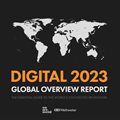
Subscribe & Follow
Jobs
- Head of Performance Marketing South Africa
- LinkedIn Outreach Assistant - Remote Cape Town
- Creative Content Video Editor Johannesburg
- Influencer Campaign Manager Cape Town
- Pioneering Coordinator Cape Town
- Social Media Manager Cape Town
- Video Editor for Social Media Content Cape Town
- Social Media Manager and Strategist Cape Town
- Junior Digital Art and Social Media Marketing Coordinator Johannesburg
- Multi Media Journalist | South Coast Sun Durban
Top 10 digital myths you should stop believing in 2023

1. Myth: The Facebook era is over
Think again! Despite popular belief, Facebook remains among the top three most used social media platforms in South Africa and worldwide. Out of the share of internet users between the ages of 16 and 64 who actively use social media platforms, Facebook is the second most used platform in South Africa (87.2%), coming in only 6.1% below Whatsapp (93.3%). In addition, the second largest share (18.6%) of active social users within the above-mentioned age demographic say that Facebook is their favourite social media platform, with Whatsapp taking the largest share (33.6%). With regards to the time spent on the platform, users spend an average of 14 hours and 42 minutes per month on Facebook, coming in second place right after YouTube.
2. Myth: Internet users spend hours aimlessly on social media
Not true! It is dangerously easy to fall down the rabbit hole of social media, engaging in content catered to individual preferences. However, contrary to what is often believed, the primary reason for internet users to be on social media platforms is for brand research, using the platforms to find information about specific brands and products. 55.8% of South African internet users use social media primarily as a source of information, with the second biggest use case (53.7%) being to stay in touch with friends and family.
3. Myth: Media users can't stand advertising and marketing
Wrong! Social media users’ attitudes towards advertising and marketing have changed in recent years. Internet users have reported feeling more represented and seen in the advertising they are exposed to. This is a positive development, with a 9.3% increase in the year-on-year attitude towards how positive advertising is perceived by users. This positive development can be attributed to advertisements being tailored to the individual preferences of users, using certain social media tools.
4. Myth: Online shopping is the ‘new normal’
False! The Covid-19 pandemic caused havoc, with restrictions forcing many transactions from the physical world into the digital sphere. Therefore, online shopping experienced a huge spike but this, however, did not last. With restrictions being lifted and ultimately coming to an end, e-commerce purchases of consumer goods have declined. There was a general decline in internet users that engaged in e-commerce activities, declining by 1.5% in comparison to the previous year. In addition, online shopping does not always include the completion of a purchase, and the online shopping cart abandonment rate on mobile devices is 84%. This suggests that physical, ‘traditional’ shopping is still as valued, and could continue to rise in popularity as the world returns to pre-pandemic times.
5. Myth: Brands are spending less on their social media marketing budgets
Disproven! A common misconception seems to be that social media marketing budgets have decreased, when in reality, quite the opposite has occurred. The total ad spend across all offline and online channels is $45.24bn. 82.7% of that total ad spend ($37.42bn) is spent on digital ads. Not only is the majority of ad spend allocated to digital ads, but there has been a 12.8% year-on-year growth in digital ad spend ($4.3bn). From a South Africa perspective, 56.52% of African organisations planned to increase their social media budget in 2023.
6. Myth: Instagram has a bigger ad reach than TikTok in South Africa
False! TikTok has risen to extreme popularity all over the world, with marketing efforts taking place on the platform. While Instagram ads reached 13% of the South African internet user base, TikTok ads reached 27.2% of the local internet user base. This data suggests that marketers need to start incorporating the platform into their digital marketing strategy. It has also been revealed that the size of Instagram’s ad audience in South Africa decreased by 250 thousand (-4.2%) between October 2022 and January 2023.
7. Myth: Cryptocurrencies are booming
Nope! Cryptocurrencies have been in and out of the public spotlight for nearly a decade now, with a recent boom in popularity last year. While they remain an important development to keep an eye on, they are not as widespread as assumed, with only about 9.5% of all internet users owning a form of cryptocurrency.
8. Myth: Social media users don't trust influencers
They do! Influencers play an important role in most social media activity, with users looking to influencers for inspiration, guidance, recommendations and warnings. It has been found that nine out of 10 consumers are more likely to trust influencers, rather than traditional or celebrity advertisements and endorsements. Influencers are better positioned to provide personalised advice and insight, knowing exactly who their target audience is and what they want to hear and see. Recent research has shown that influencer marketing will become more important, as customers and brands collaborate more closely with influencers. Companies will also start to slowly abandon traditional marketing efforts in favour of social media influencer marketing. Social media users don't only turn to influencers for recommendations but also when it comes to what to avoid. This trend is referred to as TikToks ‘de-influencers’. This new trend aims to work against the over-saturated marketing environment and provide social media users with personal, trustworthy advice on products and services.
9. Myth: People are spending more time on the internet
Wrong! Despite the fact that more and more people are connected to the internet, the average daily internet usage time has decreased by 6.7%, which is roughly 30 minutes less than in 2022.
10. Myth: The increasing awareness regarding social media and its influence on mental health leads to a decline in social media use
False! Despite an increased awareness surrounding the adverse effects of social media use, the average time spent on social media has increased. Globally, active social media users spend 2 hours 31 minutes per day on social platforms, which has increased by 2% from 2022. Not only has the amount of time spent on social media increased, but so has the amount of people using the platforms. There has been a 3% year-on-year increase in the amount of global active social media users.
About Katherine McInnes
Katherine McInnes is head of Marketing, Africa at Meltwater- South Africa’s digital landscape maturation in 2024: Insights from the 2024 Global Digital Report27 Mar 14:09
- Black Friday media coverage 202301 Dec 12:19
- Springboks media coverage at the RWC 202302 Nov 09:23
- How to use technology to prepare for Black Friday01 Nov 13:00
- B2B and TikTok - more compatible than expected?05 Sep 11:34























